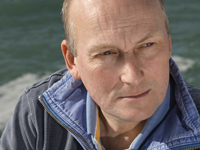
Tuesday, October 11, 2016 • 7 p.m.
100 Bell Museum Auditorium
Free admission with registration at z.umn.edu/covestrolecture16
Marine debris is a growing environmental problem. It is widely distributed at the sea surface, on the sea bed, and on shorelines. About 75 percent of this litter is plastic. Nearly 700 species are known to encounter marine litter, with many reports of physical harm resulting from entanglement in and ingestion of plastic debris.
We acknowledge plastic litter does not belong in the ocean. Numerous societal bene ts that are derived from everyday use of plastics can be achieved without emitting plastic waste into the environment. About 8 percent of world oil production is currently used to make plastic items; we need to change the way we produce, use and dispose of plastic items. A solution to two major environmental problems, our non-sustainable use of fossil carbon (to produce plastics) and accumulation marine litter, may lie in utilizing end-of-life plastics as a raw material for new production.
